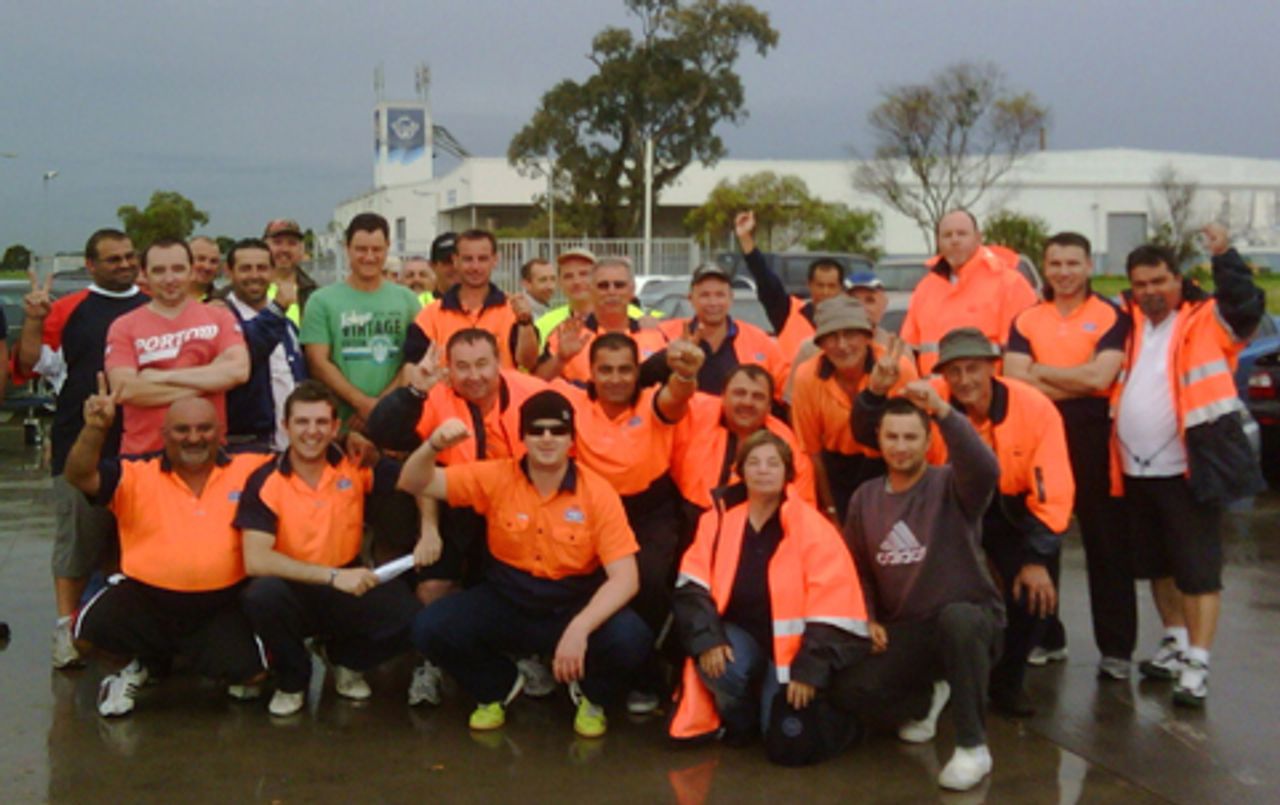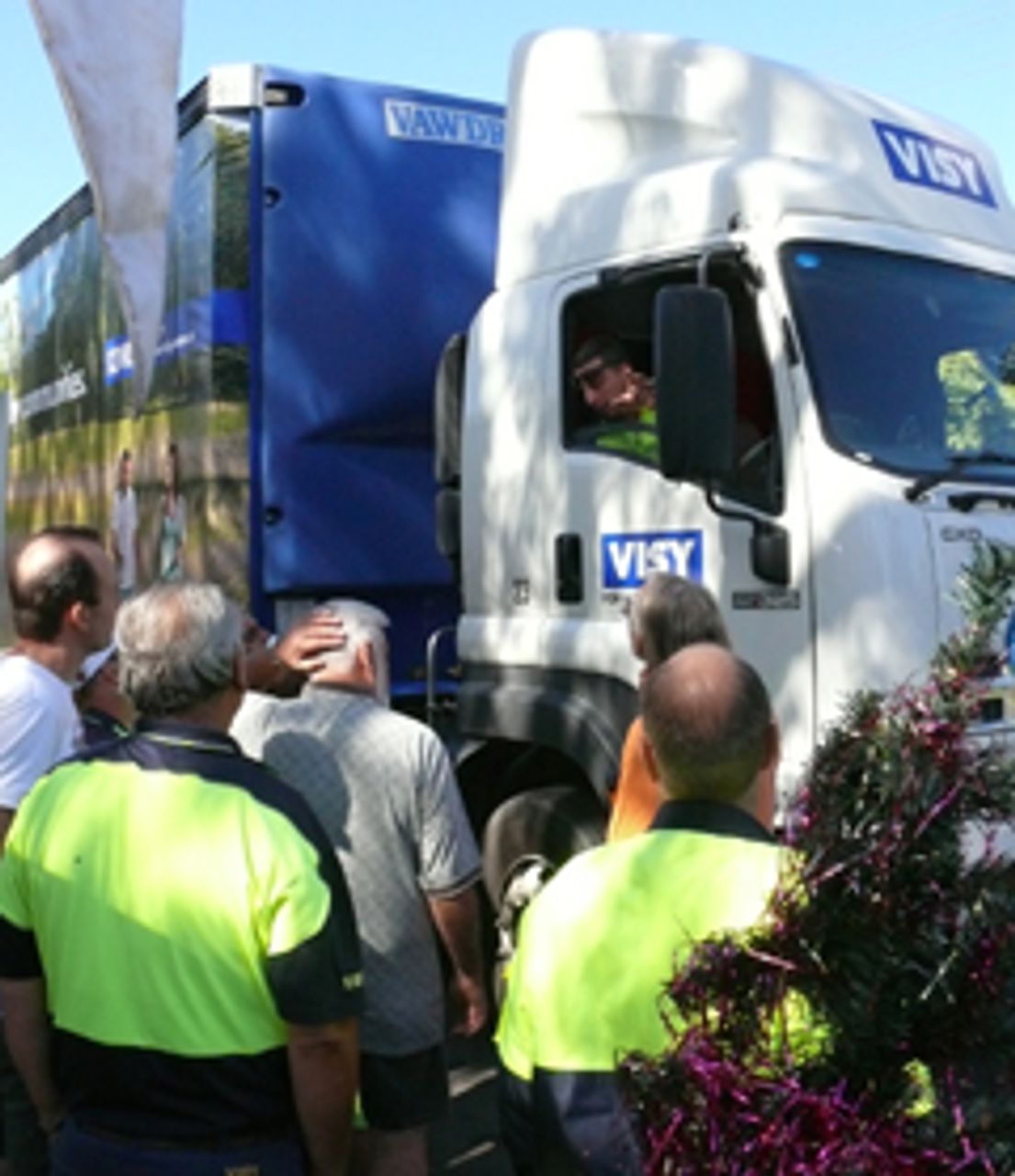In a major attack on basic democratic rights, including the right to strike and picket, nearly 30 striking Visy Board workers were arrested this morning on a picket at the company’s Dandenong plant in Melbourne. The giant paper and cardboard producer responded to industrial action at its Melbourne and Sydney plants with a highly organised attack by more than 30 police on 120 pickets.
Workers were arrested for “besetting a premises”—and could face up to three months’ imprisonment if convicted. One worker was injured by a strike-breaking vehicle, and another striker had a heart attack after his brother, who also works at the plant, was arrested.
The strike, which involves more than 500 workers nationally, began on December 3, after the company refused to continue negotiations on a new enterprise bargaining agreement (EBA). Visy workers are opposing management attempts to cut casual pay rates, increase the number of casual and contract workers, change the dispute resolution procedures, and reduce machine manning levels without consultation. They are also fighting for a 15 percent pay increase over three years.
Last Friday, Visy management secured a Victorian Supreme Court injunction banning union organisers and delegates from the Dandenong picket. The next day, the company attempted to transport a busload of strike-breakers into the plant but were stopped by the pickets who also blocked seven trucks. Several trucks driven by unknown drivers swerved at the picket line (see video). Visy responded by using helicopters to repeatedly fly strike-breakers into the plant and restart production.
 Dandenong picket line
Dandenong picket lineA Dandenong striker told the WSWS yesterday about the company’s mounting attempts to break the picket line: “On Saturday a bus came with scabs and a police inspector was on the bus. They filmed us all and we’ll probably get an injunction against us on Monday. We’re not going anywhere and we’ll probably get arrested. We’re getting more and more isolated. When we go, we’ll have to get more to replace us and when there are more police than us, they’ll break the picket.
“They had seven trucks here and a bus, which we turned away. Then they used helicopters, flying in management and what would you call them—‘colleagues’. I’ve seen four helicopters and they’ve made 40 or 50 flights and they’ve fired up the mill and the boiler.”
Asked to comment on the Labor government’s repressive Fair Work Australia industrial relations laws, which ban almost all industrial action, including solidarity stoppages, he replied: “Would you call it a Labor government? I don’t think there’s a Labor government; the Labor Party is long gone.”
Pickets at Warwick Farm and Smithfield in Sydney were also threatened with arrest during the past week if they attempted to stop trucks entering those plants. According to the striking workers, a combination of non-union drivers and Transport Workers Union members are crossing the picket lines.
A Warwick Farm worker told the WSWS that company officials had been phoning the wives of strikers and telling them that their husbands should resume work. “They’re trying to smash the unions at Visy,” he said. “This is just like what the Howard government tried to do to the wharfies [in 1998].”
In the 1998 dispute, hooded scabs were initially used by stevedoring company Patricks to try to break strike action on the waterfront. Ultimately, Patricks obtained all its productivity speed-up demands by negotiating a deal with the Maritime Union of Australia and the Australian Council of Trade Unions (ACTU).
Visy, the world’s largest privately-owned paper recycling and packaging corporation, is notorious for its provocative strike-breaking measures. It has previously used police and helicopters to transport strike-breakers, victimised union delegates and locked out workers during enterprise bargaining disputes.
 Pickets at Warwick Farm
Pickets at Warwick FarmVisy’s latest assault is in line with growing big business demands that the Gillard Labor government “review” its Fair Work laws and introduce even harsher measures to restrict or prevent strike action. Visy’s actions also follow the arrest and prosecution of striking Melbourne West Gate Bridge construction workers in 2009 and last month’s revelations that construction company, Thiess Degremont, mounted a secret spying operation against workers at the Wonthaggi desalination plant building site.
While Visy is stepping up its offensive, the striking workers are being isolated by the unions. The Australian Manufacturing Workers Union (AMWU), which covers the striking workers, has not mobilised its other members in the packaging, manufacturing and printing industries, nationally or internationally, or other union members confronting similar attacks. Instead, the union insists that Visy workers cannot go outside the parameters dictated by Labor’s Fair Work legislation. At a hearing in the Fair Work Australia tribunal last week, the union committed itself to resume negotiations with Visy.
Workers everywhere must come to the defence of the Visy strikers. The attack on their jobs, conditions and basic democratic rights can be defeated only if striking workers and their supporters establish independent rank and file committees. They must organise outside the union apparatuses to develop the active support of fellow workers, including those in Visy plants throughout Australia and internationally. Such a fight requires a socialist perspective that places the major corporations, like Visy, under social ownership and the democratic control of working people as part of the struggle for a workers’ government.
* * *
Before today’s arrests, striking workers at the Warwick Farm and Dandenong Visy plants spoke with the WSWS about the issues in their strike.
 Gavin
GavinGavin, a Dandenong machine operator, said: “Since I started ten years ago, it’s been a constant cutback, cutback, cutback—a constant downward spiral—reduced manning levels, reduced maintenance and cleaning, in every aspect of the business.
“I haven’t seen any acceleration since the global financial crisis but it’s just been constant so that you almost don’t even notice it. I doubt Australia has escaped the economic crisis—we just haven’t been hit by it yet—and management knows it. That’s why they’re trying to speed up all this stuff. They’d love to get us all out and re-hire us as casuals.
“Visy wants casuals to save money and to get leverage on us as full-time workers. That’s what it’s about. Ultimately I think you’ll find over the course of five to ten years that you’ll see half the full-time workers that you see here. Visy will have a majority of casuals.”
Another Dandenong worker, who wanted to remain anonymous, commented on the initial WSWS article: “That article was the only thing that discussed our Sydney brothers. I did a Google search and your article came up, and this one about the Prysmian strike, which is the first I’d heard about them. How come these poor people have been swept under the carpet? It’s because money buys the media.”
 Minh Nguyen
Minh NguyenMinh Nguyen, 37, from Warwick Farm, said: “The company wants to change our manning levels and increase casuals. At the moment casuals have to be made full-time if they’ve been here more than three months, and contractors that have worked her for a year also have to be made full-time workers. The company wants to lift that to six months for casuals and two years for contractors.
“This will make a big difference because it means that Visy can gradually get rid of all the full-timers. We have to support each other in this strike. That’s the only way to make the company listen and we have to be prepared to stay here for as long as it takes.”
The authors also recommend:
Australia: Prysmian strikers face growing dangers as unions maintain isolation
[6 December 2010]
Australia: Desalination plant workers strike over corporate spying revelations
[20 November 2010]
Subscribe to the IWA-RFC Newsletter
Get email updates on workers’ struggles and a global perspective from the International Workers Alliance of Rank-and-File Committees.
